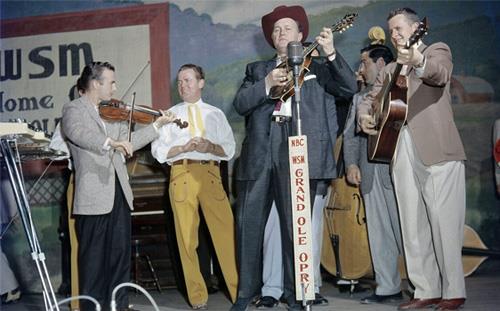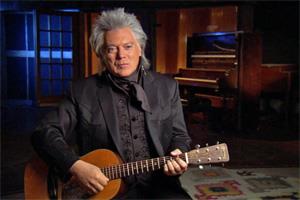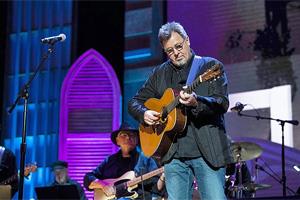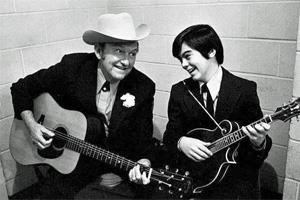
To understand the big-tent view of Ken Burns' Country Music (airing on PBS beginning Sunday, September 15– check local listings) let's step back 46 years.
It's May of 1973, at the Michigan State University Auditorium. The concert has the Eagles ... and Gram Parsons (with Emmylou Harris) ... and Lester Flatt (with Marty Stuart).
Really. The band that would make "Life In the Fast Lane"... and the guy from the Byrds... and the guy whose mandolin propelled The Beverly Hillbillies. Tickets ($7) included a second night, with Quicksilver, Canned Heat, and REO Speedwagon.
 It was, Stuart (left) said in the book of the film, "the first time I saw rock and roll and bluegrass and honky-tonk and folk music and gospel music collide...I remember thinking, 'It can all exist under the umbrella of country music.'"
It was, Stuart (left) said in the book of the film, "the first time I saw rock and roll and bluegrass and honky-tonk and folk music and gospel music collide...I remember thinking, 'It can all exist under the umbrella of country music.'"
It's the sort of rich stew that Burns – who's made an epic, 16-plus hour documentary – envisions. And recounts.
For instance, each Beatle had a country inspiration. It was cowboy songs for Ringo, Marty Robbins ballads for Paul, and Jimmie Rodgers for George, Burns said at the most recent Television Critics Association (TCA) Press Tour. "For John, it will be no surprise; it's Hank Williams."
James Brown sang at the Grand Ole Opry. "The first song he did was 'Tennessee Waltz,'" Stuart said. Then "Porter (Wagoner) kept egging him on, and so the second song he did was 'Sex Machine.'"
Black bluesmen fueled the country pioneers. Bill Monroe learned from his town's best musician, Arnold Schultz, said Dayton Duncan, who wrote the Country Music narration; when young Johnny Cash moved to Memphis, he "ended up spending time on the porch with Gus Cannon, a black musician from the old jug band era."
Jazz great Charlie Parker would play country songs on the jukebox, Burns said. "All the other cats in the band would say, 'Bird, what are you doing playing that?' And he said, 'Listen to the stories.'"
 The stories have fueled country music. Late in the series, we hear the deeply moving ones behind such songs as Vince Gill's (right) "Go Rest High on That Mountain" and Kathy Mattea's "Where've You Been?'"
The stories have fueled country music. Late in the series, we hear the deeply moving ones behind such songs as Vince Gill's (right) "Go Rest High on That Mountain" and Kathy Mattea's "Where've You Been?'"
Rosanne Cash was reluctant to bare her pain in songs the way her father (Johnny Cash) did. "I was very shy and private. (But) we are in the premier service industry of the heart and soul."
Not all the musicians came from backwoods roots, of course. Gill's dad was a judge, Harris' was a Marine officer, Kris Kristofferson's was an Air Force major general.
But there are clear trends, Burns said. "Most of the stars experienced a kind of stultifying poverty... Dolly Parton's parents paid the doctor who (delivered) her with a sack of cornmeal."
This sometimes molded greatness. For a stretch, Dwight Yoakam said, there was "no greater American musical poet maybe than Merle Haggard...He was born in the labor camp in California," feeling a pain that "Mama's Hungry Eyes" reflected. "That song is as elegant a piece of writing as Steinbeck."
Stuart recalls seeing his own mother deeply moved by that song. "That's what country music is; when it takes your heart, and you have no power over it...That is the moment that tore me up."
In small-town Mississippi, Stuart said, his mother obsessed on country music. When he was 11, they went to a concert by Connie Smith (who was then 28), and he declared he would marry her someday. At 13, he joined Flatt's band, playing guitar and mandolin.
 "I lived with Lester Flatt (left, with a very young Stuart) and his wife Gladys for about two years, until my family moved to Nashville," Stuart said. Soon, he was hanging with Monroe and Roy Acuff and Grandpa Jones and more. "These were my pals. What I saw was the beauty in their lives. I saw history in motion."
"I lived with Lester Flatt (left, with a very young Stuart) and his wife Gladys for about two years, until my family moved to Nashville," Stuart said. Soon, he was hanging with Monroe and Roy Acuff and Grandpa Jones and more. "These were my pals. What I saw was the beauty in their lives. I saw history in motion."
Their business slumped until "Dueling Banjos" was in the Deliverance movie in 1972. Flatt, who had been doing the song for years, played it for a college booking session in Cincinnati. "The show blew up, and we encored nine times...The next day, his agent booked 72 college campuses."
That's how the bluegrass master ended up on a campus show with the Eagles, and Parsons, and Harris offering music at its broadest.
When Flatt's band broke up, Stuart backed Cash for a while, before going solo. He married Cindy Cash (Johnny's daughter, Roseanne's sister), and later really did marry Connie Smith. That happened 27 years after his brash prediction. Now they've been married 22 years, and Stuart quotes her as the ultimate source: "My wife, Connie Smith, calls country music 'the cry of the heart.'"